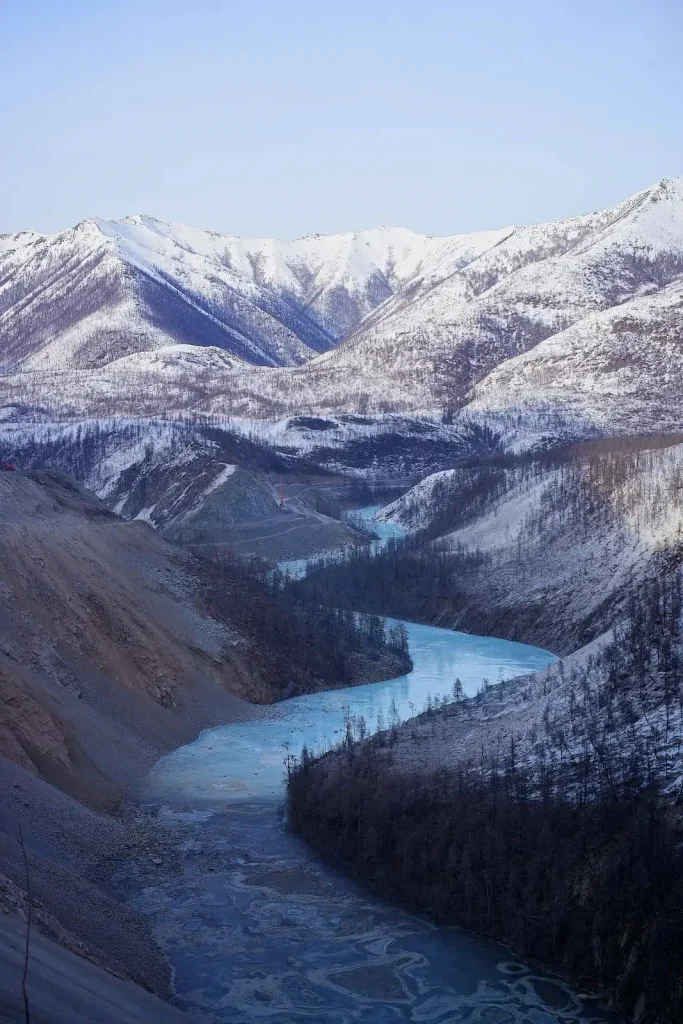
Welcome to the world of winter, snow, sheer cold, and the people who live in the never-melting snow. In this article, we are ready to journey into the coldest regions in this world, where even the concepts of therm, heat, and warmth seem out of place. Here is what many of our fans have been saying about our previous episodes: The show is a journey through nature unfrozen – come with us through the cold snow fields – it is a survival of the fittest here… Welcome to a world where the cold freezes everything, where a breath of fresh air makes you appreciate the grand and severe nature of the winter kingdom.
Table of Contents
Top 10 Coldest Places on Earth
1. Vostok Station, Antarctica

Location: Located in the middle of the east part of the continent.
Cold Record: The temperature record is low on the planet −128.6 F or −89.2C on 21 July 1983.
Purpose: Founded in 1957 by the Soviet Union, it is the research station for studying glaciology, meteorology, and space sciences.
Scientific Significance: Vostok is vital for studying the Antarctica ice sheet and sub-ice lakes, particularly Lake Vostok, which might host microbial life beneath the ice.
2. Oymyakon, Russia

Location: A Siberian part of Russia district in the Sakha Republic (Yakutia).
Cold Record: took the Record for the lowest temperature in the Northern half of the sphere −67.7° F – 55.4° C.
Climate: Specifically, in Oymyakon, temperatures vary significantly, with winter temperatures averaging under −40°F (−40°C).
Human Inhabitation: However, people live in Oymyakon all year round, with a small population that is pretty accustomed to the severe cold.
3. Verkhoyansk, Russia

Location: Another town in Siberian Russia near the northern polar circle.
Cold Record: Temperature has reduced to −67.6°F (55.4°C) Celsius.
Climate: It is famous for its temperatures; it jointly ranks as the place with the lowest temperatures in Oymyakon.
Historical Importance: Scientific and military interests have been utilizing Verkhoyansk for a long time as a rather isolated outpost of Russia.
4. Mount McKinley (also Denali), Alaska, USA

Location: A colossal mountain in Alaska; Denali National Park and Preserve.
Cold Record: The lowest temperature at the summit is 7.5 °C or -59.5°F.
Significance: Denali is instrumental in meteorological, climatic, and environmental analysis and research endeavors at high elevations.
Climbing and Challenges: It also has severely steep slopes, which, due to extreme cold, high wind, and low oxygen, makes the mountain one of the most difficult to conquer globally.
5. Ellesmere Island, Canada

Location: Located within the Canadian Arctic Archipelago, close to the northernmost area of Canada.
Cold Record: Winter temperatures drop as low as −58°F (- 50°C).
Scientific Role: The island is home to research stations studying Arctic animals and birds, glaciers, and climate change.
Importance: The area is relevant for investigating the impacts of climate change in the Arctic, where temperatures are increasing faster.
6. Amundsen-Scott South Pole Station

Location: Sited at the south pole, 9,301 ft (2,835m).
Cold Record: The cold season, winter, can record very low temperatures of as low as − 82. 8°F ( − 63.8 °C).
Research Focus: It serves mainly as a base for scientific research in astrophysics, meteorology, and climate change.
Significance: IOP is used to investigate cosmic rays, atmospheric processes, and ice sheet changes due to climate change in the Antarctic region.
7. Plateau Station, Antarctica

Location: On the continent, the inland East Antarctic region is close to the Das-eating glacier.
Cold Record: Contributed measurements of −119.2°F (−84°C) taken in the 1960s.
Closure: Abandoned in the early 1960s, it still features extreme climate factors such as cold.
Research Importance: Glaciology and climate conditions of the station were researched during operations, specifically, ice sheets in the central area of Antarctica.
8. Zhangbaishan, China

Location: It is a mountainous area located in the northeastern part of China, close to Russia.
Cold Record: the temperatures have reached an average of low of −58.2°F (-50.1°C).
Geography: The area is mountainous and has a continental climate, enhancing the freezing winter weather.
Scientific Focus: Zhangbaishan then, regarding not being the most popular place for research among cold zones, holds the information for climate investigation and the alpine type of landscape.
9. Sakha Republic (Yakutia) Russia

Location: A large Siberian Russia district with numerous small populated places.
Cold Record: Winters are especially cold since temperatures steadily fall to as low as minus 64 point 4 Fahrenheit, or 53 point 6 Celsius.
Climate Extremes: It experiences extremely cold winter and a large differential between summer and winter temperatures.
Human Adaptation: Yakutsk, the region’s capital, has people who live through these conditions, and constructions are specially adapted for that.
10. McMurdo Station, Antarctica

Location: Along the Southern Ocean coast in Antarctica near the Ross Sea.
Cold Record: The temperature can usually fall to 58 F below zero (50 centigrade) in winter.
Significance: McMurdo is the biggest research station in the region and is an important science center for Antarctic research in areas such as biology, glaciology, and Earth sciences.
Role in Research: This is an essential place to learn about Antarctic species, glaciers, and climate change’s impact on the poles.
You Might like
10 Longest Rivers in the World
10 most beautiful islands in the world
Comparison chart
| name | Temperature Record | Location |
|---|---|---|
| 1. Vostok Station, Antarctica | −128.6°F (−89.2°C) | Antarctica |
| 2. Oymyakon, Russia | −67.7°F (−55.4°C) | Siberia, Russia |
| 3. Verkhoyansk, Russia | −67.6°F (−55.4°C) | Siberia, Russia |
| 4. Denali (Mount McKinley), Alaska, USA | −75.1°F (−59.5°C) | Alaska, USA |
| 5. Ellesmere Island, Canada | −58°F (−50°C) | Canadian Arctic |
| 6. Amundsen-Scott South Pole Station, Antarctica | −82.8°F (−63.8°C) | South Pole, Antarctica |
| 7. Plateau Station, Antarctica | −119.2°F (−84°C) | East Antarctica |
| 8. Zhangbaishan, China | −58.2°F (−50.1°C) | China (near the Russian border) |
| 9. Sakha Republic (Yakutia), Russia | −64.4°F (−53.6°C) | Siberia, Russia |
| 10. McMurdo Station, Antarctica | −58°F (−50°C) | Antarctica |
Conclusion
Vostok Station and Oymyakon and Verkhoyansk in Antarctica, Siberia, and Alaska are some of the planet’s absolute lowest temperature locations, known as Poles of coldness. These areas bear the harshest climates where temperatures often drop close to or even below freezing and, most importantly, are chosen for many scientific stations. Facilities at these places, including Amundsen-Scott, McMurdo, Lauren, and Palmer stations, offer crucial information on climate, glaciology, and ecosystems in such environments. Although the areas of these continents are not friendly to humanity due to extremely low temperatures, they are rich in information needed to explain climate change and provide solutions for future ones.
FAQs
What is the coldest place on Earth?
The lowest temperature recorded on this planet was at Vostok Station in Antarctica.−128.6 °F (−89.2 °C) recorded on the 1983 July 21. ed in Antarctica. It holds the record for the lowest temperature ever recorded on Earth: −128.6°F (−89.2°C), which occurred on July 21, 1983.
Why is it so cold in Antarctica?
The area is known as the coldest part of the earth because it is situated at the south pole, at high altitudes, and in the path of the polar jet stream. The continent gets barely any sunshine, or even a few hours a day during the winter, whereby the sun might not rise for as many months. It is also colder here because the ice sheet reflects the heat.
Where is the coldest inhabited place on Earth?
Oymyakon, a village in Siberia, Russia, is considered the coldest permanently inhabited place in the world. Oymyakon is one of the coldest spots on earth, with temperatures that can go as low as −67.7°F (-55.4°C), the record of the coldest temperature set in the Northern Hemisphere. The record for the coldest temperature ever recorded in the Northern Hemisphere.
What are the coldest temperatures ever recorded?
The lowest temperature was −128.6°F (−89.2°C) in Vostok Station, Antarctica on 21 July 1983. This is the coldest temperature ever recorded using a thermometer on this planet.
How do people survive in such cold places?
The inhabitants of areas experiencing extremely low temperatures, such as Oymyakon and Verkhoyansk, cover their bodies in warm clothing and reside in adequately insulated structures. Also, they use sophisticated heating systems and have schedules to avoid contact with extremely low temperatures. Science complexes like Antarctica have warmth-inspiring shelters, and people adhere to appropriate measures to stay alive.
